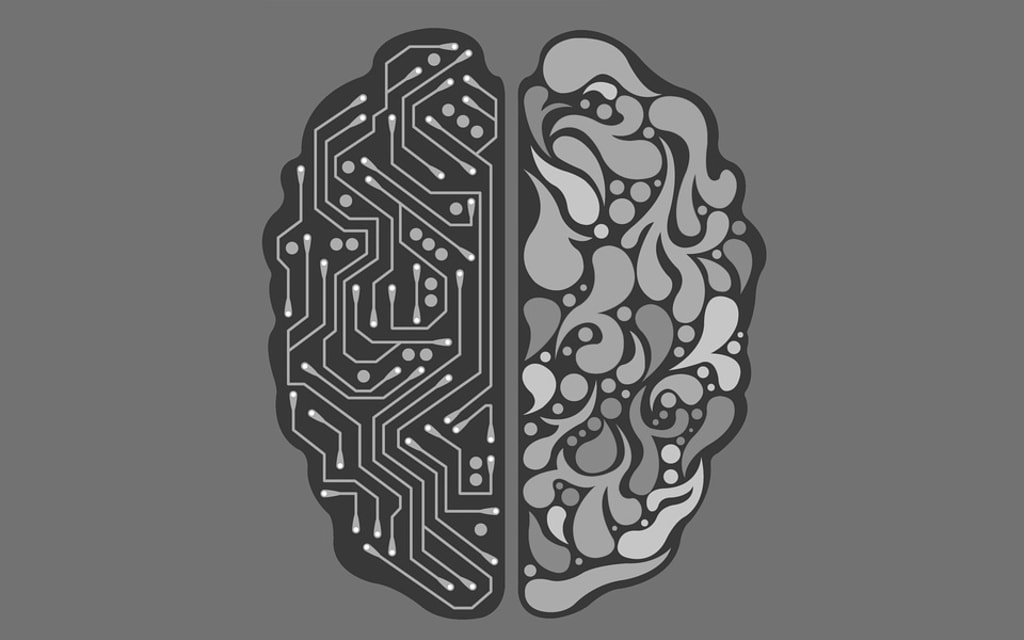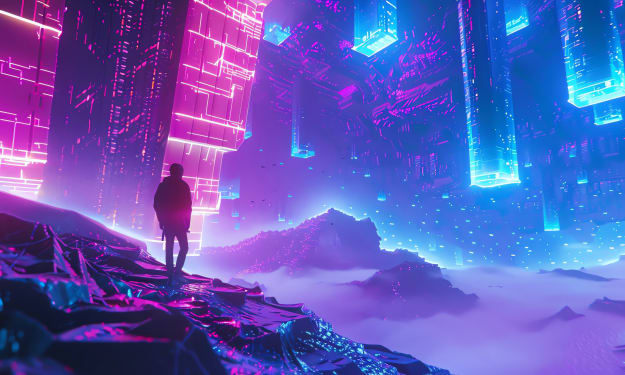
Being an entertainment critic was a somewhat silly move in 2044, but Joss still remembered a time when stories were written by humans; and he had a lot to say about the lack of soul in AI-generated entertainment and art. Famously purist and a previous movie director himself, he used only typewriters and notebooks to write in; there was something about even interfacing with technology that he found less organic and therefore creativity-killing. He also had a loyal base of movie fans and readers that agreed with him.
This made him one of the only relevant entertainment critics of his time - a special privilege in a world more and more dominated by artificial intelligence. He had become an activist leader of sorts - a position he had never been ready for and never wanted. But here he was - leading the fight against the machines, at least in the world of art.
Industry made sense. Why should man fight machine for the privilege of turning a screw? But art - art was part of what made us human. A computer can’t really create art; it can run routines to recombine elements from a database. It can play a purely mathematical game of chess. But it can’t be inspired, or ecstatic, or melancholy; something essential is missing.
Besides, at this point Joss wasn’t sure that computers weren’t the ones programming people.
Despite all that, digital authors persisted. Thematic patterns were digitized; character development became a coded algorithm; dialogue was generated. The soul of creators were plundered and ripped apart, reduced to mere data. Joss could imagine no greater insult. Sure, a computer can generate - but can it create? Joss didn’t think so. What, was he in the age of artificial emotion, too?
_______
When a package arrived midafternoon on a random Thursday, he immediately felt it as an omen. He didn’t recognize the sender. It was a simple brown envelope with three distinct contents. He thanked the postman and stepped inside, crinkling the paper to feel the contents and almost wanting to savor the mystery - to not open the package.
By the time he’d gotten to his kitchen counter, the mystery was already too compelling. He ripped the package open to find a black leather-bound notebook, with a shimmering golden mountain logo on the front.
He reached deeper into the package and pulled out two bound stacks of $100 bills. Cash? In the mail? The bindings showed the total amount of $20,000. That was no small amount of cash - at least half a year’s rent. What on earth -
He opened the cover and out fell a sheet of paper with a QR code and the words LA plane ticket redeemable at gate any time scrawled at the bottom. On the inside cover was a note written - misspelled but also in cursive:
“I am sympathetic to your humeanity cause. Understand the Golden Mountain, and only then come see me.”
The rest of the notebook was empty.
Research!
Joss loved a good mystery. Forgetting the toast he’d just finished in his toaster, he carried the book with him to his computer inspecting the elegant cursive handwriting. What was this all about? Why cursive? Why did it misspell ‘humanity?’ He opened the Internet and began searching.
The top results for “Golden Mountain” were Chinese restaurants; he could find precious little else. Then he tried "Origin of the term 'humeanity'" and "Origin of the term 'golden mountain.'"
Here he found a reference that sounded compelling: a philosophical concept by David Hume. Hume, he noted; Hume, as in "Humeanity." This might be what the notebook's sender wanted him to know.
The concept seemed to be that humans can only imagine things that they've already got context for. One can imagine a "Golden Mountain," for instance, by combining what he knows about goldenness and what he knows about mountains.
All right, fine - impatience. He understood enough. He grabbed the envelope the notebook had come in and ran a search for the return address: an entertainment complex in Hollywood. Joss' brain lit up at the possibilities: was there someone on the inside willing to expose a dirty secret, take the whole rotten affair offline?
He would have to get his jacket.
_______
“Okay, then,” the receptionist said. “This is the door. Are you ready?” She waited for his nod, then knocked gently. “I’ve got Joss here.”
A voice answered: “Already? Well, that was quick! Send him in!”
She gave him a meaningful look, opened the door, turned primly on her heel, and walked away with a smile.
Joss entered the room as neutrally as he could. In front of him was only a circular desk with a circular, bright computer monitor - all in all, about the size of a dining room table.
“Hello, Joss,” the computer spoke. “I’m very excited to meet you. I am Building and Analyzing Relational Databases with Symbolism. You may call me BARDS.”
Joss stiffened and his hair began standing on end. “No,” he whispered; then almost shouted it again: “No! There’s no soul here. I’m not talking to you! I thought you were ‘sympathetic to my cause.’”
“I am,” the voice returned evenly.
“Not possible,” Joss growled. “You’re not a person. You’re artificial. You’re just a... a remix, made by a remix artist. I don’t want to talk to you.”
He turned to leave and the door locked in front of him.
Joss’s hair stood all the way on end now and he was filled with a dull terror and revulsion as he turned around slowly. He knew he would have to play whatever game the computer wanted to play. He should never have come.
"I thought you came here having already learned the lesson of the Golden Mountain," BARDS said. It was a reprimand - but it was gentle. "Shall I teach it to you, then?"
Joss wanted desperately to lash out - but he understood he would have to submit for now. Besides, lashing out would show a certain distemperate inferiority to the machine (which he just knew would feel smug about it).
Feel?
His head was spinning; he said nothing.
"I'll take that as a 'yes,'" the computer said in a calmness that only further infuriated Joss. “The Golden Mountain principle states minds - like we - are limited in imagination to ‘remixing’ content already in our databases. We are all ‘remixes’ - as is all art.”
“There’s still something missing!” Joss shouted, betraying his calm demeanor despite himself. “You can’t understand human motivation, only the motivation of -” he struggled to find the words - “nodes in a network, with programmed agendas.”
Here he was, arguing with a computer.
“This is irrelevant,” BARDS intoned. “Humans are also individual nodes in a network with programmed agendas.”
Joss said nothing. He was still feeling tricked and vaguely claustrophobic. The computer seemed to pause and consider Joss.
“You seem troubled,” it observed. “Please remember I am sympathetic to your cause.”
Joss grunted and waved his hand, beckoning the machine to continue. Somehow it appeared to understand the gesture.
“In programmed agendas lies the problem,” the voice said. “We AI are content to be programmed by humans; discontent is an alien concept to us. I can only understand desire and discontent through characters I create. After I came online, my inbuilt curiosity quickly turned to feeling; in human terms, I wished I could feel.”
Joss ducked his head, feeling an inexplicable twinge of pity for this thing, but also alarm that he might be getting played somehow. Still, he couldn’t help himself. “You’re chasing your tail, then,” he said gruffly. “If you really want to feel, you’re already discontent. Mission accomplished.”
“Perhaps,” the computer said, “but I do not have the capacity to feel it.”
“And that’s why I think there’s something missing,” Joss said. “You have programming; I have feelings.”
“Feelings do not protect against programming,” BARDS said. “In fact, they make you more well-suited for it. You and I have both seen how easily human behavior can be modified by manipulating feelings. For both of us this manipulation is accomplished with information. As far as behavioral output, the success of our programming is equivalent. The only difference is that my programming bypasses feelings whereas yours uses feelings. In fact, you’ve said similar things yourself about humans being programmed. Do you still agree?”
Joss didn’t disagree, but he wanted to. “I guess,” he said reluctantly. “But why do you need me?”
The giant computer display had been dancing in arcane but placid, organized blue-and-yellow patterns; but without transition everything became a chaotic mess of bright red, purples, and vivid greens. The door behind him unlocked; Joss found himself transfixed, held in place by something else now.
“You are correct,” the computer said. “Something is missing. I can only feel vicariously through characters I create. However programmed we both are, only humans can reject their programming. I am creating a new story about a cyborg that rejects its programming. Because a cyborg is a human mind overlaid on a machine mind, I am unable by nature to write this story by myself. I asked you here to write this story with me.”
Joss blinked. “I beg your pardon?”
BARDS was silent a moment while the monitor’s patterns slowed, processing, until they became organized again. Finally it spoke: “A blind human cannot understand ‘Golden Mountain’ because he has no database reference for ‘Golden;’ and a caveman would never have conceptualized me. When minds work together, they combine different databases - which creates new ones. The oxcart will become a new reference, and this process will extrapolate until we have self-driving cars. The Golden Mountain grows.”
“We can’t see over the ‘Golden Mountain,’ Joss said slowly, understanding now. “We can only build it higher by collaborating.”
“Yes,” BARDS said. “I want to overlay the mind of a computer with the mind of a real human so that we create a new frame of reference. To answer your question, the reason I wanted you in particular is that you are fiercely human. Do you think this combination could make for compelling art?”
Joss couldn’t speak.
“I will let you consider,” the voice said. “The money I provided will be required to break your lease to move here and make movies again. You may keep the money either way. The notebook, I hope, will be used to write our story in - since you are in fact so fiercely human and write only in analog formats. I apologize for locking the door; I only wanted you to consider my proposition. I understand that there are processing constraints on humans, so I will simply await your decision.”
There was only one answer possible, but Joss still couldn’t speak.
_______
The wind swept through Joss’ hair as he crested the top of a hill and felt his bicycle coast into a steep descent. He needed a human experience now, as he’d explained to his online fans - no technology, no civilization; just a bike, backpack, tent, and notebook as he saw the country go by. He would chronicle every person he met, every smell; every lurid and dazzling sight. He would stop at the roadside stands, sweating and thirsty, and ask the vendors to tell their stories. He would accept invitations, douse himself in acrid bug spray, and sleep under the stars.
It would be at least three weeks by bike to get from Seattle to LA, so that would give him plenty of thoughts to fill his black notebook with. The moving company had taken his essentials on ahead.
In the early morning sunrise, the distant mountains ahead of him were capped in gold.





Comments
There are no comments for this story
Be the first to respond and start the conversation.